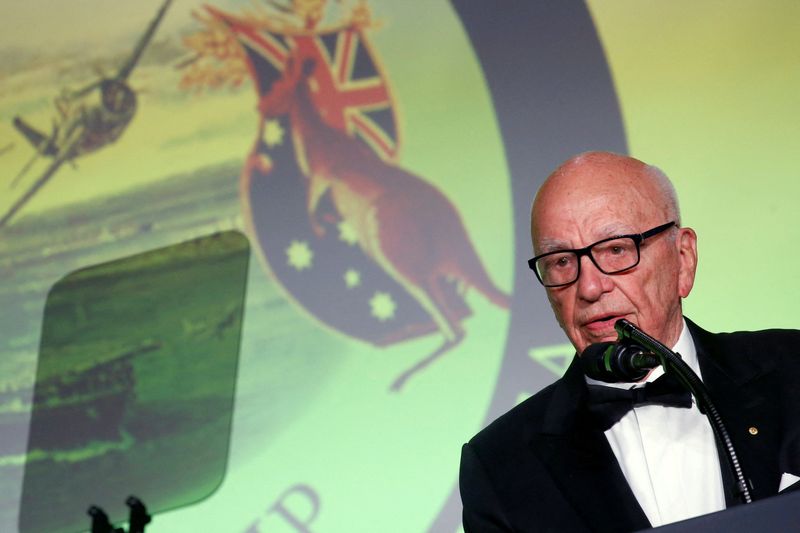By Byron Kaye
SYDNEY (Reuters) – For some Australians, Rupert Murdoch’s exit from the leadership of his media empire was a time to reflect on the country’s greatest business success story.
For others, it was a welcome reduction of influence for a man they viewed as a danger to democracy, and indeed, the planet.
But as the country that produced the most powerful modern media figure processed the news he was stepping down as chairman of Fox Corp and News Corp, a consensus view quickly formed that there would never be another like him.
“For one bloke to lead the world’s most powerful family, build a A$30 billion ($19 billion) family fortune, and influence global affairs for decades is extraordinary,” said Stephen Mayne, a former News journalist turned shareholder activist who has grilled Murdoch about the company’s dealings at 15 annual meetings since 1999.
“Sadly, certainly in recent years, so much of that legacy has been toxic,” added Mayne, citing Murdoch outlets’ amplification of 2020 U.S. presidential election falsehoods and questioning of climate science, among other things.
The populist conservative media empire which Murdoch built over seven decades from a single Adelaide newspaper spreads across three continents but its influence remains unrivalled in Australia, where some 60% of daily newspapers, including national broadsheet The Australian, are News Corp-owned.
Even at a time when media consumption is splintering from traditional routes, particularly among younger people, Murdoch’s influence is embedded in the country’s information ecosystem because of its massive reach, media experts said.
His local properties include Sky News Australia, a cable TV channel fashioned on the partisan style of U.S. network Fox News.
“What you publish in the Australian gets a second bounce through Sky gets a third bounce through the state daily papers,” said Shane Homan, head of Monash University’s media, film and journalism school.
“The Murdoch papers still have that key reach with working-class demographics that can still be influential,” he said.
That was why Australian politicians across the ideological spectrum continued to pursue friendly relationships with the company, unlike in other markets where left-leaning lawmakers were more likely to avoid it, Honan added.
POLITICAL REACTION
Federal Treasurer Jim Chalmers, asked by the Australian Broadcasting Corp (ABC) if Murdoch’s newspapers had treated his left-leaning Labor party unfairly, said he wouldn’t discuss “whether or not I feel stories or coverage have been fair”.
“The body of work is there for all to see,” Chalmers told the broadcaster. “He has been in lots of ways a controversial figure, but an influential figure too, and this is an end of an era at News.”
Foreign Minister Penny Wong, asked by reporters in New York about Murdoch’s exit, said “any fair-minded observer might say that some of the papers might not exactly be cheerleaders of the Labor Party, but that’s what happens in a democracy”.
“I wish him well for his retirement,” she added.
Australian politicians no longer in office took a less measured approach. Former Prime Minister Malcolm Turnbull, a moderate conservative, said “the business pages will give him credit” for the success of Fox and News Corp “but he has done enormous damage to the democratic world”.
“The anger-tainment ecosystem that Fox News, above all, has created in the U.S. has left America angrier and more divided than it’s been at any time since the civil war,” Turnbull told the ABC.
Murdoch’s exit cuts a native tie between News Corp and Fox Corp and Australia, where Murdoch was born. His son Lachlan Murdoch, who becomes sole chairman of News Corp and continues as chair and CEO of Fox, was born in Britain.
However, Lachlan Murdoch, whose wife is Australian, continues to live in Sydney with his family and commute to the U.S. where the two companies are based, a spokesperson said.
Australia, in return, continues to play an outsize role for Murdoch’s companies.
It was a campaign led by his Australian newspapers that prompted the country’s government in 2021 to force tech giants Meta and Google owner Alphabet to pay media outlets for content displayed on their websites, since they attracted advertising dollars.
The U.S. and Canada now plan similar laws.
A year earlier, News Corp’s coverage of devastating Australian bushfires questioned the role of global warming and drew a rebuke from Murdoch’s other son, James Murdoch. He quit the company’s board, citing disagreements over editorial content, a few months later.
($1 = 1.5569 Australian dollars)
(Reporting by Byron Kaye; Editing by Jamie Freed)
